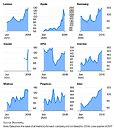Raevenlord
News Editor
- Joined
- Aug 12, 2016
- Messages
- 3,755 (1.22/day)
- Location
- Portugal
| System Name | The Ryzening |
|---|---|
| Processor | AMD Ryzen 9 5900X |
| Motherboard | MSI X570 MAG TOMAHAWK |
| Cooling | Lian Li Galahad 360mm AIO |
| Memory | 32 GB G.Skill Trident Z F4-3733 (4x 8 GB) |
| Video Card(s) | Gigabyte RTX 3070 Ti |
| Storage | Boot: Transcend MTE220S 2TB, Kintson A2000 1TB, Seagate Firewolf Pro 14 TB |
| Display(s) | Acer Nitro VG270UP (1440p 144 Hz IPS) |
| Case | Lian Li O11DX Dynamic White |
| Audio Device(s) | iFi Audio Zen DAC |
| Power Supply | Seasonic Focus+ 750 W |
| Mouse | Cooler Master Masterkeys Lite L |
| Keyboard | Cooler Master Masterkeys Lite L |
| Software | Windows 10 x64 |
Even as we achieve consumerism in scales hitherto unseen, tech companies always want to sell more - there's "always" increased production, there must always be increased, projected demand from customers. However, when demand isn't there, and growth slows down or even stagnates, production takes its time to adjust - and already manufactured products have few opportunities other than going on towards a swelling inventory.
This is what is happening with a myriad of tech companies, such as Apple, Samsung, Xiaomi, Intel, Hon Hai (Foxconn), among others. We could even take a page from our own PC industry and look at NVIDIA's Pascal inventory that is in need of clearing up - and which has resulted in bottoming prices of previous-gen cards as we look towards the new RTX 20-series. Which, coincidentally, have been launched with increased pricing over the previous generation. Perhaps another way of moving old inventory?



All of these companies are achieving inventory levels that are 20 to 30 percent increased YoY (year over year), with the exception of Apple, which doubled its inventory. At the same time, that the turnover period for stocks (that is, the time it takes for old stock to be sold and rotated for new inventory) is slowing is an interesting pointer for not only decreased demand, but also overproduction. And as we've seen with some companies which have had to write-downs millions of dollars in unsold hardware, though, these downturns have very real implications for companies' bottom lines - and hence, their share value. Of course, this could have a cascading effect throughout the industry.
View at TechPowerUp Main Site
This is what is happening with a myriad of tech companies, such as Apple, Samsung, Xiaomi, Intel, Hon Hai (Foxconn), among others. We could even take a page from our own PC industry and look at NVIDIA's Pascal inventory that is in need of clearing up - and which has resulted in bottoming prices of previous-gen cards as we look towards the new RTX 20-series. Which, coincidentally, have been launched with increased pricing over the previous generation. Perhaps another way of moving old inventory?



All of these companies are achieving inventory levels that are 20 to 30 percent increased YoY (year over year), with the exception of Apple, which doubled its inventory. At the same time, that the turnover period for stocks (that is, the time it takes for old stock to be sold and rotated for new inventory) is slowing is an interesting pointer for not only decreased demand, but also overproduction. And as we've seen with some companies which have had to write-downs millions of dollars in unsold hardware, though, these downturns have very real implications for companies' bottom lines - and hence, their share value. Of course, this could have a cascading effect throughout the industry.
View at TechPowerUp Main Site






